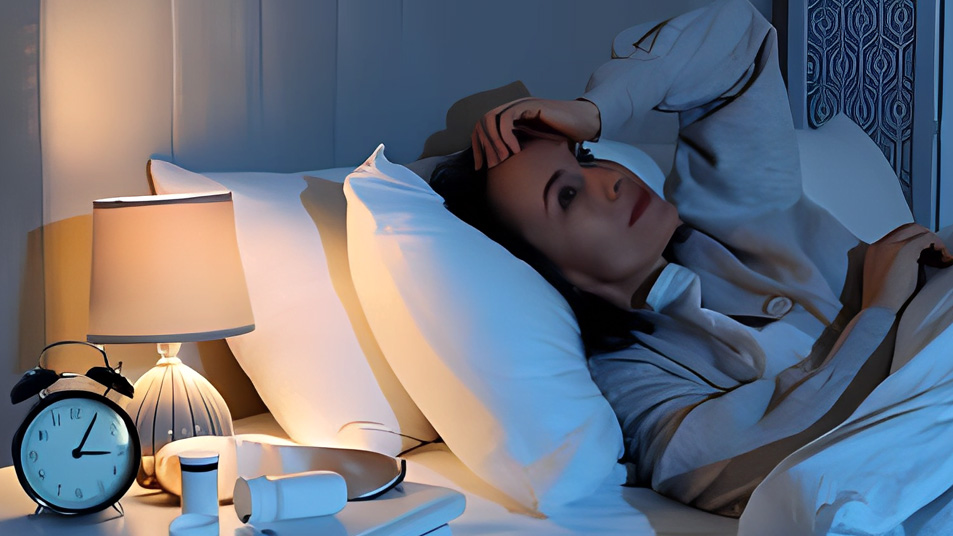
What is Insomnia
Insomnia is a sleep disorder characterized by difficulty falling asleep, staying asleep, or getting restful sleep. People with insomnia often feel dissatisfied with their sleep and may experience daytime fatigue, mood disturbances, and difficulty concentrating. It can be acute, lasting for a short
period, or chronic, persisting for months or longer. Causes of insomnia can range from stress and anxiety to medical conditions or poor sleep habits. Treatment typically involves addressing the underlying cause and may include lifestyle changes, cognitive-behavioral therapy for insomnia
(CBT-I), or medication in some cases.
Causes of Insomnia
Insomnia is a common sleep disorder characterized by difficulty falling asleep, staying asleep, or achieving restorative sleep. It can lead to daytime fatigue, impaired cognitive function, and reduced quality of life. Understanding the causes of insomnia is crucial for effective management and treatment.
Below are the primary factors that can contribute to the development of insomnia:
Psychological Factors :
Stress : Work, financial issues, or personal relationships can keep the mind active and make it difficult to fall asleep.
Anxiety : Persistent worry or anxiety can interfere with the ability to relax and fall asleep.
Depression : Depression can lead to changes in sleep patterns, including trouble falling asleep or waking up too early.
Trauma and PTSD : Individuals who have experienced traumatic events may suffer from insomnia as part of post-traumatic stress disorder (PTSD).
Medical Conditions :
Chronic Pain : Conditions like arthritis or back pain can make it difficult to find a comfortable sleeping position.
Respiratory Issues : Asthma, allergies, and chronic obstructive pulmonary disease (COPD) can disrupt breathing during sleep.
Neurological Disorders : Issues like Parkinson’s disease or Alzheimer’s can affect sleep patterns.
Hormonal Changes : Menopause or other hormonal imbalances can impact sleep.
Endocrine Disorders : Hyperthyroidism and other hormonal imbalances can lead to sleeplessness.
Gastroesophageal Reflux Disease (GERD) : Acid reflux can cause discomfort that interrupts sleep.
Medications :
Prescription Medications : Some medications, including those for hypertension, asthma, or depression, can interfere with sleep.
Over-the-Counter Medications : Certain allergy medications or stimulants can have side effects that disrupt sleep.
Lifestyle Factors :
Caffeine and Nicotine : These stimulants can interfere with the ability to fall asleep or stay asleep.
Alcohol : While alcohol may help some people fall asleep initially, it can disrupt the sleep cycle and reduce sleep quality.
Irregular Sleep Schedule : Frequently changing your sleep times or working irregular shifts can disrupt your body's internal clock.
Environmental Factors :
Noise : Persistent or sudden noises can interrupt sleep or make it difficult to fall asleep.
Light : Exposure to light, especially blue light from screens, can interfere with the body's production of melatonin, a hormone that regulates sleep.
Behavioral Factors :
Poor Sleep Hygiene : Inconsistent bedtimes, using electronics before bed, or engaging in stimulating activities close to bedtime can affect sleep quality.
Lack of Physical Activity : Insufficient exercise can lead to difficulties in falling asleep.
Understanding the underlying cause of insomnia is crucial for finding the most effective treatment and improving sleep quality.
Symptoms of Insomnia
Insomnia, a common sleep disorder, can manifest through a variety of symptoms. Here are some of the most common ones :
Difficulty Falling Asleep : Struggling to get to sleep even when you’re tired.
Frequent Waking : Waking up multiple times during the night and having trouble falling back asleep.
Early Morning Waking : Waking up too early and not being able to go back to sleep.
Unrefreshing Sleep : Feeling tired or unrefreshed upon waking, despite having slept for a full night.
Daytime Fatigue : Experiencing drowsiness, irritability, or difficulty concentrating during the day due to poor sleep quality.
Increased Sleep Latency : Taking an unusually long time to fall asleep after going to bed.
Sleep Fragmentation : Having disrupted or restless sleep with frequent awakenings.
If these symptoms persist for more than a few weeks or are affecting your daily life, it’s a good idea to consult with a healthcare provider for evaluation and appropriate management.
Treatment of Insomnia
Insomnia, characterized by difficulty falling or staying asleep, can be managed through various treatments, including behavioral, psychological, and pharmacological approaches. The treatment choice often depends on the underlying cause of insomnia (e.g., stress, medical conditions, lifestyle factors), and its severity (acute or chronic).
Cognitive Behavioral Therapy for Insomnia (CBT-I)
CBT-I is considered the most effective, long-term treatment for chronic insomnia. It addresses the underlying thoughts and behaviors contributing to sleep problems.
Techniques include :
Sleep restriction : Limiting time in bed to match the actual sleep duration and gradually increasing it.
Stimulus control : Associating the bed with sleep by avoiding activities like watching TV or eating in bed.
Cognitive restructuring : Addressing unrealistic fears and thoughts about sleep, which can perpetuate insomnia.
Relaxation techniques : Deep breathing, progressive muscle relaxation, or mindfulness to reduce anxiety before sleep.
Alternative and Complementary Approaches :
Melatonin supplements : Often used to help regulate the sleep cycle, especially for shift workers or people with jet lag.
Herbal remedies : Valerian root, chamomile, and lavender are commonly used, though their efficacy is less well-studied.
Acupuncture and yoga : Some people find these methods helpful for improving relaxation and sleep quality.
Treating Underlying Conditions :
If insomnia is secondary to conditions such as anxiety, depression, pain, or sleep apnea, treating these conditions can alleviate sleep problems. For instance, continuous positive airway pressure (CPAP) therapy is used for sleep apnea, while anxiety and depression might require psychotherapy and medications.
Depression : Antidepressants may be prescribed to help both mood and sleep.
Anxiety : Treatment may involve therapy, medication, or both to address anxiety-related sleep issues.
Sleep Apnea : If insomnia is related to sleep apnea, treatments like CPAP (Continuous Positive Airway Pressure) may be needed.
A tailored approach, combining behavioral and lifestyle changes with medical treatment, if necessary, is often the most effective way to manage insomnia.
